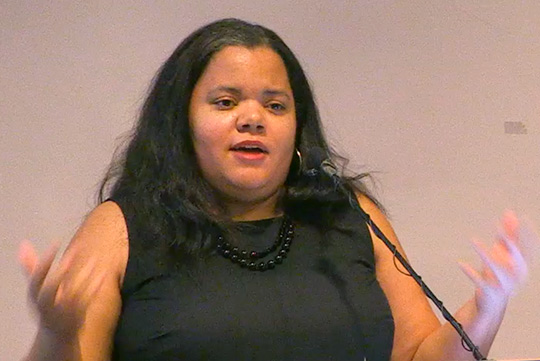Arguing for Spaces to Foster Math Identity: TC's Erica Walker delivers the prestigious Falconer Lecture
Erica Walker, Professor of Mathematics Education, delivered the prestigious Etta Z. Falconer Lecture in August at the annual meeting of the Mathematical Association of America (MAA) in Washington, D.C. Headlined “Math Fest 2015,” this year’s meeting celebrated the 100th anniversary of MAA’s founding.
The Falconer Lecturer, which is co-sponsored by MAA and the Association for Women in Mathematics, is chosen on the basis of distinguished contributions to the mathematical sciences or mathematics education. Etta Falconer was a pioneering Spelman College mathematician and educator who helped promote math and science careers for many women and minorities.
Walker, a former public high school math teacher who earned her doctorate in administration, planning and social policy, is an authority on the social and cultural factors and educational policies and practices that facilitate math engagement, learning and performance, especially for underserved students. She is the author of two books, Building Mathematics Learning Communities: Improving Outcomes in Urban High Schools (Teachers College Press, 2012) and Beyond Banneker: Black Mathematicians and the Paths to Excellence (SUNY Press, 2014).
In her lecture, titled “A Multiplicity All At Once: Mathematics for Everyone, Everywhere,” Walker drew on 20 years of teaching and research to explore the question “What does it mean to say that some people are ‘math people?’” She argued that our “mathematical lives” are informed by informed by our multiple identities, by math-related experiences we have both in and out of school, and in particular by “mathematical spaces” that either support or undermine our “positive mathematics socialization.” Just as education has increasingly recognized varied cultural and community contexts that promote literacy, there is a need to recognize that “there are many ways to be a math person,” in both formal and informal spaces that include classrooms, neighborhood sports games, family home improvement projects, churches and other venues.
“In my research with elementary and high school students, teachers and mathematicians, I’ve seen that purposeful and affirmative mathematical spaces reflect the bridging of people’s out-of-school and in-school networks, relationships and experiences,” Walker says. “And they can challenge the pervasive discourses of deficiency that permeate some discussions of mathematics achievement.”
Published Thursday, Sep. 24, 2015
